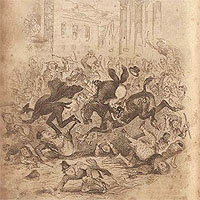Disengagement
Victor Davis Hanson says we should disengage with much of the world, it appears -- at least in terms of the current arrangement. He recommends that the United States pull out of places like the DMZ, discontinue its European garrisons, and leave Europe to the Iranians. He recommends disengaging with erstwhile allies, who are conflicted by their association with America, and bolstering ties with ones that are reliable. He suggests deference to the EU and the UN for some global crises, such as Darfur.
Mr. Hanson concludes:
Mr. Hanson supposes that the risks inherent with disengagement might produce some positive outcomes -- being missed as democracy's bulldozer might be psychologically satisfying, and we might be less reliant on other nations for economic security.
I doubt that disengagement will realistically work to make the world a safer place. But I sure understand the sentiment.
Mr. Hanson concludes:
To establish such a muscular independence and let our former dependents and erstwhile allies get a life, or at least what they wish for, the United States will have to embrace three broad goals that should be the centerpiece of our foreign policy. We need increased defense spending, especially in transport, mobile forces, missile defense, and carriers that both require as little dependence as possible on foreign basing and provide maximum protection for the U.S. mainland.I don't know what to think of this. The tone of Mr. Hanson's essay is bitter, and resigned. He probably wouldn't deny that. Disengagement is tempting, but hardly realistic in this era. On the other hand, things have to change. We can't fight this war alone. So many of our entanglements have to do with energy, and heavy investing in energy independence would be a good thing. Not that President Bush is be the man to initiate that task. That's my biggest disappointment in his presidency.
Second, we must find a middle path to energy independence that embraces conservation, nuclear power, more exploration, alternative fuels, coal — anything other than sending billions more to god-forsaken regimes abroad that will only recycle those easy dollars in ways to weaken or destroy us as they deny that’s what they’re doing.
Finally, we must seek similar financial independence, and get our annual deficits and national debts under reasonable control to ensure immunity from creditors who increasingly are turning hostile.
The American people are way ahead of our leaders. Most outside of New York and Washington shrug when they read of the latest anti-American poll or well-heeled elite condemnation, and wish only to move on.
When we do, we will be pleasantly surprised at how it enjoyable it is to be missed.
Mr. Hanson supposes that the risks inherent with disengagement might produce some positive outcomes -- being missed as democracy's bulldozer might be psychologically satisfying, and we might be less reliant on other nations for economic security.
I doubt that disengagement will realistically work to make the world a safer place. But I sure understand the sentiment.

